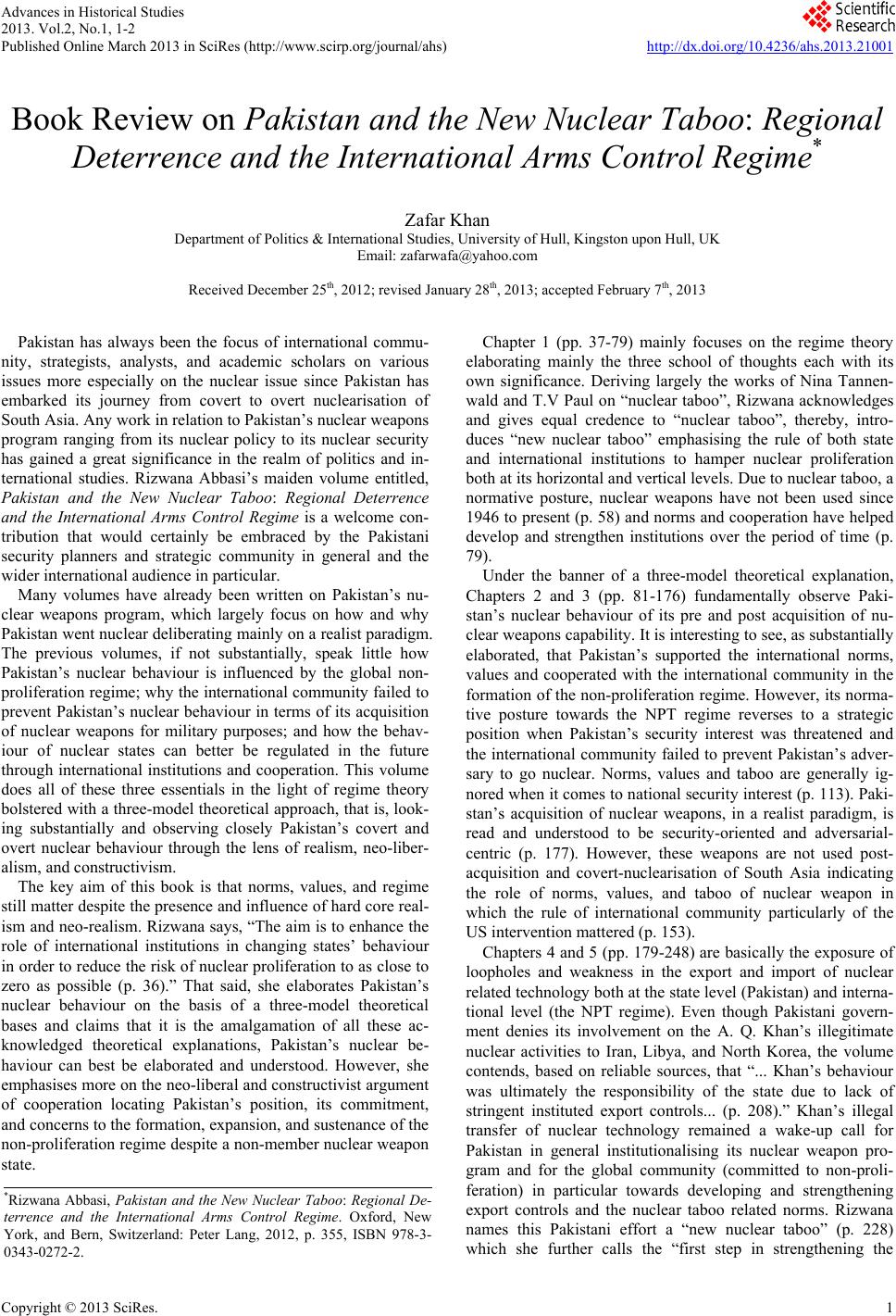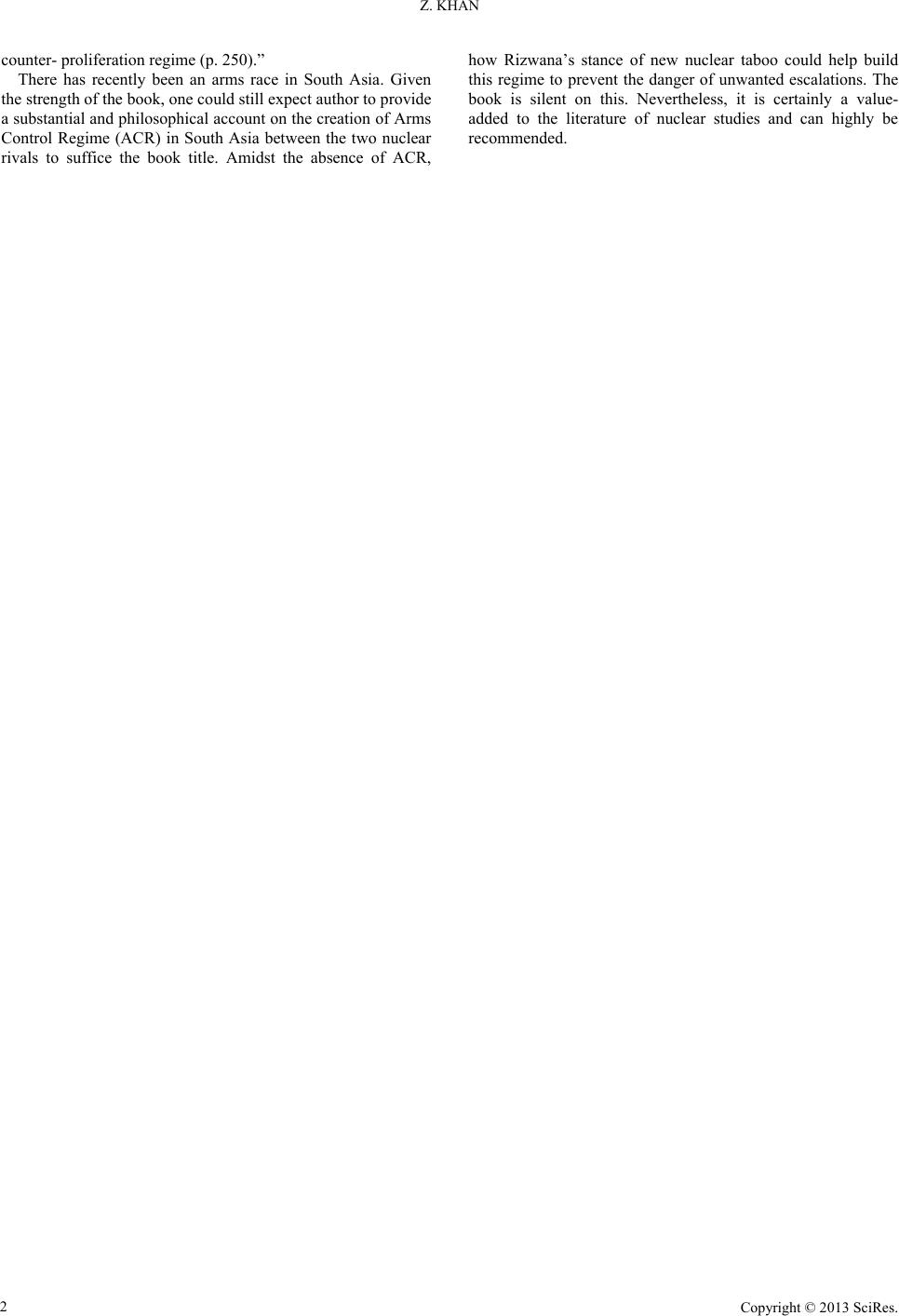Paper Menu >>
Journal Menu >>
 Advances in Historical Studies 2013. Vol.2, No.1, 1-2 Published Online March 2013 in SciRes (http://www.scirp.org/journal/ahs) http://dx.doi.org/10.4236/ahs.2013.21001 Copyright © 2013 SciRes. 1 Book Review on Pakistan and the New Nuclear Taboo: Regional Deterrence and the International Arms Control Regime* Zafar Khan Department of Politics & International Studies, University of Hull, Kingston upon Hull, UK Email: zafarwafa@yahoo.com Received December 25th, 2012; revised January 28th, 2013; accepted Feb rua ry 7th, 2013 Pakistan has always been the focus of international commu- nity, strategists, analysts, and academic scholars on various issues more especially on the nuclear issue since Pakistan has embarked its journey from covert to overt nuclearisation of South Asia. Any work in relation to Pakistan’s nuclear weapons program ranging from its nuclear policy to its nuclear security has gained a great significance in the realm of politics and in- ternational studies. Rizwana Abbasi’s maiden volume entitled, Pakistan and the New Nuclear Taboo: Regional Deterrence and the International Arms Control Regime is a welcome con- tribution that would certainly be embraced by the Pakistani security planners and strategic community in general and the wider international audience in particular. Many volumes have already been written on Pakistan’s nu- clear weapons program, which largely focus on how and why Pakistan went nuclear deliberating mainly on a realist paradigm. The previous volumes, if not substantially, speak little how Pakistan’s nuclear behaviour is influenced by the global non- proliferation regime; why the international community failed to prevent Pakistan’s nuclear behaviour in terms of its acquisition of nuclear weapons for military purposes; and how the behav- iour of nuclear states can better be regulated in the future through international institutions and cooperation. This volume does all of these three essentials in the light of regime theory bolstered with a three-model theoretical approach, that is, look- ing substantially and observing closely Pakistan’s covert and overt nuclear behaviour through the lens of realism, neo-liber- alism, and constructivism. The key aim of this book is that norms, values, and regime still matter despite the presence and influence of hard core real- ism and neo-realism. Rizwana says, “The aim is to enhance the role of international institutions in changing states’ behaviour in order to reduce the risk of nuclear proliferation to as close to zero as possible (p. 36).” That said, she elaborates Pakistan’s nuclear behaviour on the basis of a three-model theoretical bases and claims that it is the amalgamation of all these ac- knowledged theoretical explanations, Pakistan’s nuclear be- haviour can best be elaborated and understood. However, she emphasises more on the neo-liberal and constructivist argument of cooperation locating Pakistan’s position, its commitment, and concerns to the formation, expansion, and sustenance of the non-proliferation regime despite a non-member nuclear weapon state. Chapter 1 (pp. 37-79) mainly focuses on the regime theory elaborating mainly the three school of thoughts each with its own significance. Deriving largely the works of Nina Tannen- wald and T.V Paul on “nuclear taboo”, Rizwana acknowledges and gives equal credence to “nuclear taboo”, thereby, intro- duces “new nuclear taboo” emphasising the rule of both state and international institutions to hamper nuclear proliferation both at its horizontal and vertical levels. Due to nuclear taboo, a normative posture, nuclear weapons have not been used since 1946 to present (p. 58) and norms and cooperation have helped develop and strengthen institutions over the period of time (p. 79). Under the banner of a three-model theoretical explanation, Chapters 2 and 3 (pp. 81-176) fundamentally observe Paki- stan’s nuclear behaviour of its pre and post acquisition of nu- clear weapons capability. It is interesting to see, as substantially elaborated, that Pakistan’s supported the international norms, values and cooperated with the international community in the formation of the non-proliferation regime. However, its norma- tive posture towards the NPT regime reverses to a strategic position when Pakistan’s security interest was threatened and the international community failed to prevent Pakistan’s adver- sary to go nuclear. Norms, values and taboo are generally ig- nored when it comes to national security interest (p. 113). Paki- stan’s acquisition of nuclear weapons, in a realist paradigm, is read and understood to be security-oriented and adversarial- centric (p. 177). However, these weapons are not used post- acquisition and covert-nuclearisation of South Asia indicating the role of norms, values, and taboo of nuclear weapon in which the rule of international community particularly of the US intervention mattered (p. 153). Chapters 4 and 5 (pp. 179-248) are basically the exposure of loopholes and weakness in the export and import of nuclear related technology both at the state level (Pakistan) and interna- tional level (the NPT regime). Even though Pakistani govern- ment denies its involvement on the A. Q. Khan’s illegitimate nuclear activities to Iran, Libya, and North Korea, the volume contends, based on reliable sources, that “... Khan’s behaviour was ultimately the responsibility of the state due to lack of stringent instituted export controls... (p. 208).” Khan’s illegal transfer of nuclear technology remained a wake-up call for Pakistan in general institutionalising its nuclear weapon pro- gram and for the global community (committed to non-proli- feration) in particular towards developing and strengthening export controls and the nuclear taboo related norms. Rizwana names this Pakistani effort a “new nuclear taboo” (p. 228) which she further calls the “first step in strengthening the *Rizwana Abbasi, Pakistan and the New Nuclear Taboo: Regional De- terrence and the International Arms Control Regime. Oxford, New York, and Bern, Switzerland: Peter Lang, 2012, p. 355, ISBN 978-3- 0343-0272-2.  Z. KHAN counter- proliferation regime (p. 250).” There has recently been an arms race in South Asia. Given the strength of the book, one could still expect author to provide a substantial and philosophical account on the creation of Arms Control Regime (ACR) in South Asia between the two nuclear rivals to suffice the book title. Amidst the absence of ACR, how Rizwana’s stance of new nuclear taboo could help build this regime to prevent the danger of unwanted escalations. The book is silent on this. Nevertheless, it is certainly a value- added to the literature of nuclear studies and can highly be recommended. Copyright © 2013 SciRes. 2 |

